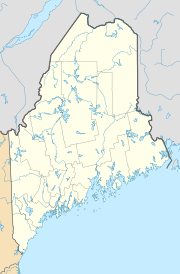Criehaven, Maine facts for kids
Quick facts for kids
Criehaven, Maine
Ragged Island
|
|
|---|---|
| Country | United States |
| State | Maine |
| County | Knox |
| Area | |
| • Total | 131.8 sq mi (341.3 km2) |
| • Land | 0.7 sq mi (1.9 km2) |
| • Water | 131.1 sq mi (339.5 km2) |
| Population
(2020)
|
|
| • Total | 4 |
| Time zone | UTC-5 (Eastern (EST)) |
| • Summer (DST) | UTC-4 (EDT) |
| Area code(s) | 207 |
| FIPS code | 23-15125 |
| GNIS feature ID | 2378260 |
Criehaven is another name for Ragged Island. It is an "unorganized territory" located in Knox County, Maine, in the United States. An unorganized territory means it does not have its own local government.
Criehaven used to be a "plantation." This was a type of small town government in Maine. It included Ragged Island, which is south of Matinicus Isle. It also included Matinicus Rock and Seal Island. Seal Island is home to the Seal Island National Wildlife Refuge. In 1925, Criehaven stopped being a plantation. It became an unorganized territory, but its name is still used.
Contents
History of Criehaven
Criehaven is pronounced "cree-haven." The island was named after Robert Crie (1826–1901). He was an early landowner there. Robert and his wife, Harriet Hall (1829–1919), moved to Ragged Island in 1849. Robert became very successful at farming and lumbering.
A Thriving Community
By 1879, Robert Crie owned the entire island. In 1896, all five of his children lived there too. They lived with their spouses and children. That same year, Robert Crie officially made Ragged Island a plantation. He named it Criehaven. For the next few decades, it was a busy small community. People fished, raised sheep, and farmed. Mr. Crie also ran a general store for many years.
Changes Over Time
After Robert Crie passed away, the island community slowly changed. Natural disasters and new times made it harder for people to stay. The population started to get smaller. In 1925, Criehaven plantation was dissolved. This meant it no longer had its own town meetings or local taxes. It went back to being a "wild land" or unorganized territory.
The island's school stayed open until 1941. After the school closed, more year-round families left the island. This also led to the closing of the general store and the post office. Today, Ragged Island is a lively summer spot. Many fishermen and vacationers visit. However, very few people live there all year round anymore.
Ragged Island is known as the "Island of Lobsters." It is proud to be the farthest offshore inhabited island on the East Coast.
Famous Residents and Stories
The island was once home to the writer Elisabeth Ogilvie. Her "Tide Trilogy" books were inspired by the island. Another writer, Dorothy Simpson, also lived on Criehaven for many years. A fictional story based on Criehaven is featured in the web series "Ragged Isle."
Geography of Criehaven
Criehaven is mostly water. The total area is about 131.8 square miles (341.3 square kilometers). Only a small part of this is land. The land area is about 0.7 square miles (1.9 square kilometers). The rest, about 131.1 square miles (339.5 square kilometers), is water. This means about 99.46% of the area is water.
Population of Criehaven
| Historical population | |||
|---|---|---|---|
| Census | Pop. | %± | |
| 1900 | 47 | — | |
| 1910 | 46 | −2.1% | |
| 1920 | 63 | 37.0% | |
| 2010 | 1 | — | |
| 2020 | 4 | 300.0% | |
| U.S. Decennial Census | |||
In 2010, only one person lived in Criehaven. By 2020, the population had grown to four people.
Many people own houses on Ragged Island. Some stay for the whole summer. Others visit for part of each week. During the summer, there are about ten families who fish for lobster. There are also about ten families who visit for vacations.
See also
 In Spanish: Criehaven (Maine) para niños
In Spanish: Criehaven (Maine) para niños
 | Tommie Smith |
 | Simone Manuel |
 | Shani Davis |
 | Simone Biles |
 | Alice Coachman |


